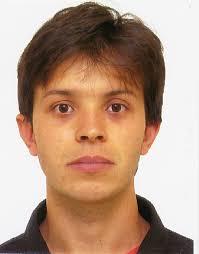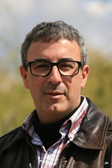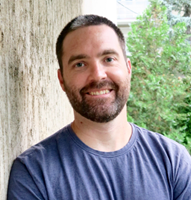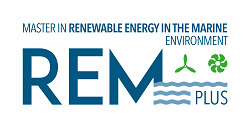Scholar Activities Intake 2021-2023
Attendace to the conferences is open to the academic community and REM associate partners. They will take place online.
- 28/02/2022 – 03/03/2022. Danilo Brandao “Power Quality Compensation with Power Electronics”
- 21/06/2022 – 21/06/2022. J. Henriques “Navier Stokes, Dimensional Analysis and Aerodinamics of Air Turbines for OWCs”
- 21/06/2022 – 23/06/2022. F. Tejero “Optimization Methods and Dimensionality Reduction Techniques for Aerodinamic Design”
- 23/06/2022 – 23/06/2022. J. Davidson “Development and Optimisation of Marine Renewable Energy Devices at Low to Mid TRLs Using Computational Models”
- 27/06/2022 – 27/06/2022. G. Giorgi “Modelling for Design: Nonlinear Hydrodynamics and Unexpected Behaviour of Floating Wave Energy Converters”
 Danilo Iglesias Brandao received the Ph.D. degree in electrical engineering from the University of Campinas, Brazil, in 2015. He was a visiting scholar at the Colorado School of Mines, USA, in 2009 and 2013, a visiting scholar at the University of Padova, Italy, in 2014, and a guest professor at the Norwegian University of Science and Technology, Norway, in 2018 and 2020. He is currently an assistant professor at the Graduate Program in Electrical Engineering with the Federal University of Minas Gerais, Belo Horizonte, Brazil. His main research interests are control of grid-tied converters and microgrids. He is a member of SOBRAEP.
Danilo Iglesias Brandao received the Ph.D. degree in electrical engineering from the University of Campinas, Brazil, in 2015. He was a visiting scholar at the Colorado School of Mines, USA, in 2009 and 2013, a visiting scholar at the University of Padova, Italy, in 2014, and a guest professor at the Norwegian University of Science and Technology, Norway, in 2018 and 2020. He is currently an assistant professor at the Graduate Program in Electrical Engineering with the Federal University of Minas Gerais, Belo Horizonte, Brazil. His main research interests are control of grid-tied converters and microgrids. He is a member of SOBRAEP.
 João C. C. Henriques was born in Lisbon, Portugal, in 1969. He received the Diploma in Mechanical Engineering in 1993, the M.Sc. in Mechanical Engineering in 1996, and the Ph.D. in Mechanical Engineering in 2006, all from the Instituto Superior Técnico (IST), Technical University of Lisbon (presently University of Lisbon). From 1993 to 2007, his main research topic was the development of numerical methods for simulating high-speed compressible flow. Since 2008, his main areas of research are the numerical and experimental modelling of wave energy converters (WECs), control of the power take-off system of WECs and the aerodynamic design of air turbines for oscillating water column WECs. He published 40 papers in peer-refereed journals. He also holds five patents, four in the field of wave energy and another in wind power. He participated in eight European projects in the area of wave energy. Presently is a Principal Investigator at Instituto de Engenharia Mecânica (IDMEC) and an Assistant Professor at IST.
João C. C. Henriques was born in Lisbon, Portugal, in 1969. He received the Diploma in Mechanical Engineering in 1993, the M.Sc. in Mechanical Engineering in 1996, and the Ph.D. in Mechanical Engineering in 2006, all from the Instituto Superior Técnico (IST), Technical University of Lisbon (presently University of Lisbon). From 1993 to 2007, his main research topic was the development of numerical methods for simulating high-speed compressible flow. Since 2008, his main areas of research are the numerical and experimental modelling of wave energy converters (WECs), control of the power take-off system of WECs and the aerodynamic design of air turbines for oscillating water column WECs. He published 40 papers in peer-refereed journals. He also holds five patents, four in the field of wave energy and another in wind power. He participated in eight European projects in the area of wave energy. Presently is a Principal Investigator at Instituto de Engenharia Mecânica (IDMEC) and an Assistant Professor at IST.
 Fernando Tejero was awarded a 5-year full-time diploma in Mechanical Engineering from the University of Zaragoza (Spain) in 2011. Upon the successful completion of his postgraduate studies, he pursued a PhD in the topic of Flow Control in Aeronautics at the “Institute of Fluid Flow Machinery – Polish Academy of Sciences” in 2015. Fernando is involved in a wide range of research areas: computational fluid dynamics, numerical methods, multidisciplinary design optimization, data-driven methods and machine learning. He has an international standing built upon a well-established research track record and has been involved in research projects within the FP7 EU and Horizon 2020 programmes.As part of his teaching activities, Dr. Tejero is leading the CFD for gas turbine module which is part of the Thermal Power MSc programme. He is also the module leader for the Thermofluids course within premaster’s in Engineering. Dr. Tejero has received several fellowships throughout his career. This includes two grants for young researchers approved by the Spanish government and a Marie Curie fellowship to undertake his doctoral studies.
Fernando Tejero was awarded a 5-year full-time diploma in Mechanical Engineering from the University of Zaragoza (Spain) in 2011. Upon the successful completion of his postgraduate studies, he pursued a PhD in the topic of Flow Control in Aeronautics at the “Institute of Fluid Flow Machinery – Polish Academy of Sciences” in 2015. Fernando is involved in a wide range of research areas: computational fluid dynamics, numerical methods, multidisciplinary design optimization, data-driven methods and machine learning. He has an international standing built upon a well-established research track record and has been involved in research projects within the FP7 EU and Horizon 2020 programmes.As part of his teaching activities, Dr. Tejero is leading the CFD for gas turbine module which is part of the Thermal Power MSc programme. He is also the module leader for the Thermofluids course within premaster’s in Engineering. Dr. Tejero has received several fellowships throughout his career. This includes two grants for young researchers approved by the Spanish government and a Marie Curie fellowship to undertake his doctoral studies.
 Dr Josh Davidson is from Townsville, Australia, where he studied at James Cook University, earning a First Class Honours degree and a PhD in the School of Engineering and Physical Sciences. He served as the Deputy Director at the Centre for Ocean Energy Research (COER), Maynooth University, Ireland, working on nonlinear hydrodynamic modelling and control of wave energy converters and the development of Computation Fluid Dynamics based Numerical Wave Tanks. He was the Committee Chair for the International Network on Offshore Renewable Energy (INORE). He is currently a Research Fellow at the Dept of Fluid Mechanics at Budapest University of Technology and Economics supported by an EU grant for the project Nonlinear Rock and Roll – Modelling and Control of Parametric Resonance in Wave Energy Converters.
Dr Josh Davidson is from Townsville, Australia, where he studied at James Cook University, earning a First Class Honours degree and a PhD in the School of Engineering and Physical Sciences. He served as the Deputy Director at the Centre for Ocean Energy Research (COER), Maynooth University, Ireland, working on nonlinear hydrodynamic modelling and control of wave energy converters and the development of Computation Fluid Dynamics based Numerical Wave Tanks. He was the Committee Chair for the International Network on Offshore Renewable Energy (INORE). He is currently a Research Fellow at the Dept of Fluid Mechanics at Budapest University of Technology and Economics supported by an EU grant for the project Nonlinear Rock and Roll – Modelling and Control of Parametric Resonance in Wave Energy Converters.
 Dr Giuseppe Giorgi received his bachelor and master degrees in Mechanical Engineering at Politecnico di Torino, Italy, and his PhD at the Centre for Ocean Energy Research at Maynooth University, Ireland. He then has been the Individual Postdoctoral Fellow of the Marie Curie action entitled OpenWave at the Marine Offshore Renewable Energy Lab (MOREnergy Lab) at Politecnico di Torino. He currently is a Senior Research Fellow at MOREnergy Lab. His expertise and research interests are in the area of nonlinear hydrodynamic modelling and in general in all aspects of wave energy conversion technologies, from lab to the sea. Moreover, Giuseppe is the leading responsible for European Collaborative Project bids for MOREnergy Lab, both as proposal coordinator or participant. Finally, Giuseppe also acts as Sponsorship Coordinator of the International Network on Offshore Renewable Energy.
Dr Giuseppe Giorgi received his bachelor and master degrees in Mechanical Engineering at Politecnico di Torino, Italy, and his PhD at the Centre for Ocean Energy Research at Maynooth University, Ireland. He then has been the Individual Postdoctoral Fellow of the Marie Curie action entitled OpenWave at the Marine Offshore Renewable Energy Lab (MOREnergy Lab) at Politecnico di Torino. He currently is a Senior Research Fellow at MOREnergy Lab. His expertise and research interests are in the area of nonlinear hydrodynamic modelling and in general in all aspects of wave energy conversion technologies, from lab to the sea. Moreover, Giuseppe is the leading responsible for European Collaborative Project bids for MOREnergy Lab, both as proposal coordinator or participant. Finally, Giuseppe also acts as Sponsorship Coordinator of the International Network on Offshore Renewable Energy.
We will discuss modeling and control of single-phase active front-end converters (i.e., inverter) and their multifunctionalities (i.e., ancillary services) in distributed generation, in general. The course goes from inverter power electronic structure, that is split into: hardware and instrumentation, current control loop plus modulator, and reference generator. The distributed multifunctional power electronic converters can be used for power quality compensation, distributed generation, microgrid and other extended application like: distributed speed drives in offshore ship vessels, offshore HVDC, aircraft and so on. Pre-developed MatLab models of power electronic inverter are used as case study, in which its modeling and control are tested. Using the MatLab Simulink as an implementation tool, the theoretical content can be evaluated and other multifunctionalities exploited and further tested by the students themselves. It enlightens the students about the flexibility and opportunities brought by the electronification into a smart energy system.
Lectures’ timetable:
Feb 28 (15h30 to 17h30) Lect. 1: Introduction to distributed generation and basics of Matlab implementation
March 1 (15h30-16h30) Lect. 2: Inverter/control/multifunctionalities – Theory
March 2 (15h30-16h30) Lect. 3: Inverter/control/multifunctionalities – Matlab implementation
March 3 (12h30 to 14h30) Lect. 4: Microgrids and Ancillary Services.
The objective is to show the student in a friendly way the mathematical formulation behind the Navier Stokes equations, using simple mathematical tools, explaining dimensional analysis as a basic design tool in marine renewable energies and finally presenting the main types of marine turbines for OWC applications, explaining its basic aerodynamics.
The activity is composed of four presentations addressing the following topics:
1) “Navier-Stokes Equations: Debunking the Myth” (2.5h) – Most fluid mechanics textbooks derive the Navier-Stokes equations using a complex and non-general formulation. The idea is to derive and explain each term of the equations that describe fluid motion (mass, momentum, and energy balances) from a physical perspective using only undergraduate math.
2) “Simplifying Complexity Using Dimensional Analysis” (2h) – The presentation explains how to apply Dimensional Analysis to model and understand engineering problems related to renewable energies.
3) “The Aerodynamics of Air Turbines for OWC” (1.5h) – Presentation describes the main types of turbines for oscillating water column wave energy converters. The starting point is the theory of lift (from a physical perspective) to explain how aerodynamics affect air turbine performance and PTO control.
Lectures’ timetable:
June 21 (12h00 to 14h30) Lect. 1: Navier-Stokes Equations: Debunking the Myth
June 21 (16h00 to 18h00) Lect. 2: Simplifying Complexity Using Dimensional Analysis
June 21 (18h30 to 20h00) Lect. 3: The Aerodynamics of Air Turbines for OWC
Aerodynamic shape optimization is a complex task due to thehigh dimensionality of theproblem, the associated non-linearity and its large computational cost. These threeaspects have an impact on the overall time of the optimization routine. For this reason, emerging methods are being developed to accelerate the design process. They include advanced geometry parameterizations, low order modeling (e.g. Kriging interpolation or neural networks), dimensionality reduction and multi-fidelity techniques. The proposed activities for this scholarship will cover the main mathematical aspects of these methods and worked examples for aeronautical applications.
The activity consists of two presentations that address the following topics:
1) “Design and optimization methods for CFD” (2,5h)
– Different geometry parameterizations to describe complex shapes
– Definition of numerical methods to predict objective functions with numerical simulations (CFD) or low order models (Kriging, radial basis functions or neural networks)
– Description of optimization methods
– Application of all described techniques to a real-world problem.
2) “Dimensionality reductiontechniques for aerodynamicdesign” (2,5h)
– Dimensionality reduction for aerodynamic design, e.g. neural network auto-encoders or the active subspace method
– Multi-fidelity methods, e.g. co-kriging
– Application of all described techniques to a real-world problem.
Lectures’ timetable:
June 21 (09h00 to 11h30) Lect. 1: Design and optimization methods for CFD
June 23 (09h00 to 11h30) Lect. 2: Dimensionality reduction techniques for aerodynamic design
The goal of the proposed activity is to teach students about the development and optimization of marine renewable energy (MRE) devices at low to mid Technology Readiness Levels (TRL) using computational models. The objective is demonstrating the advantages of early-stage numerical wave tank (NWT) experimentation to increase the Technology Performance Level (TPL) of devices before investing in expensive physical prototyping, tank and ocean testing, and then later-stage NWT simulations to supplement the physical testing campaigns.
The Lecture Course will encompass topics such as:
1) The role of NWTs in MRE device development (2h).
– Techno-economic optimization
– Strengths and weaknesses of NWTs
2) NWT Implementation (1.5h).
– Hydrodynamics
– Subsystems (Mooring, PTO and Control systems)
3) NWT Experiments (1.5h).
Lectures’ timetable:
June 23 (12h00 to 14h00) Lect. 1: The role of NWTs in MRE device development
June 23 (15h30 to 17h00) Lect. 2: NWT Implementation
June 23 (17h30 to 19h00) Lect. 3: NWT Experiments
The talk presents design-oriented nonlinear hydrodynamic modelling of wave energy converters, based on a computationally efficient approach to represent nonlinear Froude-Krylov forces in floating bodies. Latest developments of this approach belong to a MSCA-IF called OpenWave (Grant Agreement 832140), whose output comprise the open source Matlab demonstration toolbox NLFK4ALL (10.5281/zenodo.4682671). Application of the model to the SparBuoy and the ISWEC devices is presented. The unexpected behavior of parametric resonance is also articulated and discussed by means of the nonlinear model
To download the presentations right click on the tittle and select open
[last update = 05/23/2022]
